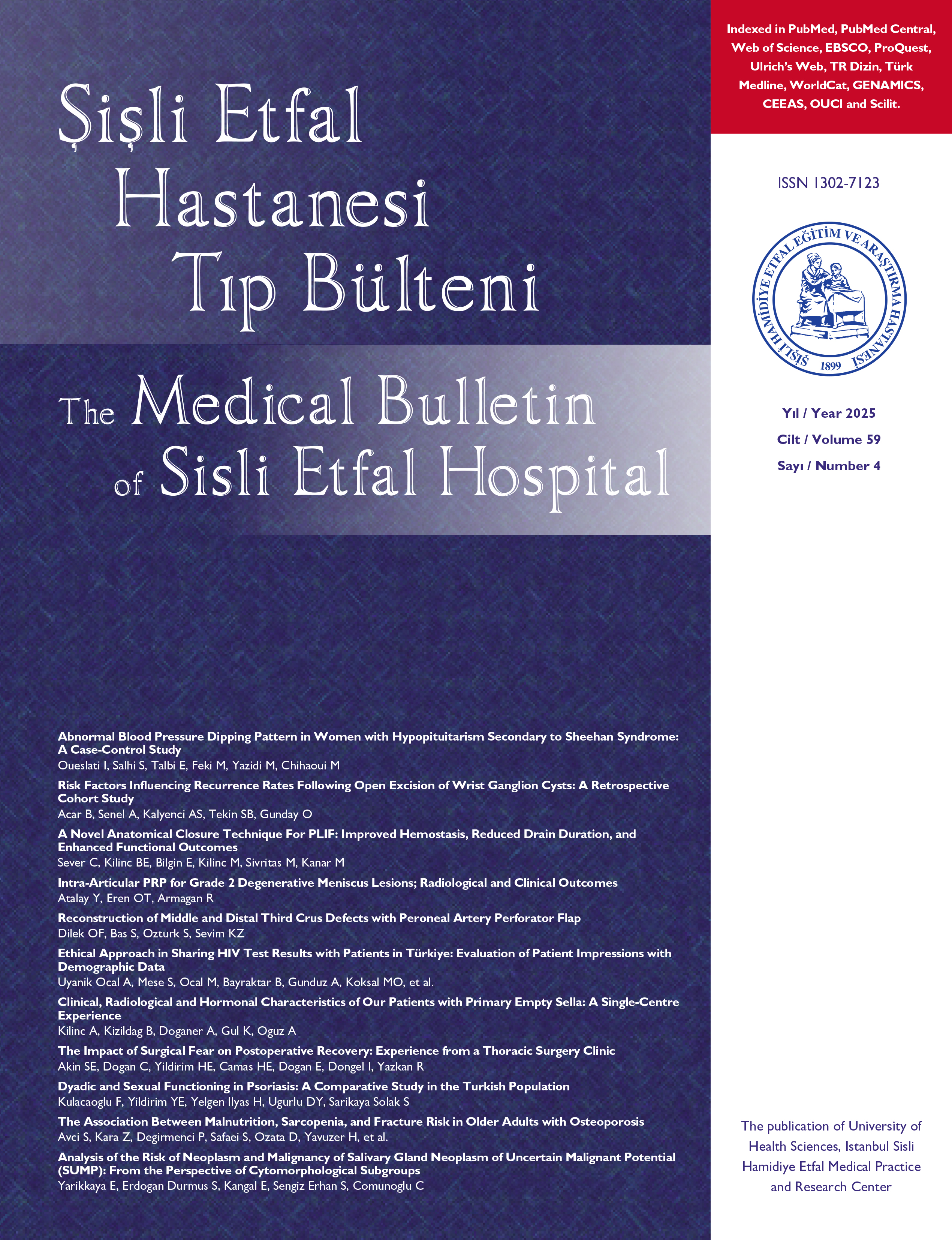
The Clinical Impact of Physical Activity on the Diagnosis of Prostate Cancer and Postprostatectomy Functional Outcomes in the Elderly
Ozgur Kazan1, Mustafa Kaan Akalin2, Meftun Culpan2, Gokhan Atis2, Asif Yildirim21Department of Urology, Kutahya Health Sciences University, Faculty of Medicine, Kutahya, Türkiye2Department of Urology, Istanbul Medeniyet University, Faculty of Medicine, Istanbul, Türkiye
Objectives: The effect of physical activity on prostate cancer is controversial. We aimed to investigate the effect of physical activity on prostate cancer detection and functional outcomes after radical prostatectomy.
Methods: Between 2019 and 2020, 166 patients who underwent prostate biopsy were included. The physical activity scores of patients were evaluated by the Physical Activity Scale for the Elderly (PASE) questionnaire before the procedure. PASE scores were compared between the patients with and without prostate cancer and local and metastatic aggressiveness of cancer. Patients who underwent radical prostatectomy were followed up for 12 months to analyze the effect of physical activity on erectile dysfunction (ED) and urinary incontinence (UI).
Results: There was no significant difference between patients with and without prostate cancer in terms of PASE scores (187.7 vs. 195.5, p=0.665). PASE scores were also similar when separated according to DAmico risk classification and metastatic events. Twenty-seven patients who underwent radical prostatectomy were evaluated in terms of functional outcomes at the first year of surgery. PASE scores of the patients with severe ED were lower than mild-moderate ED, but no statistically significant difference was observed (197.0 vs. 268.5, p=0.267). Patients with persistent UI had a significantly lower PASE score overall than continent patients (128.3 vs. 271.1, p=0.001), and PASE score was the only independent predictor of UI following radical prostatectomy.
Conclusion: The effect of physical activity on prostate cancer development or aggressiveness could not be determined. Physical activity was associated with a reduced risk of UI following radical prostatectomy.
Keywords: Erectile dysfunction, PASE, physical activity, prostate cancer, urinary incontinence
Fiziksel Aktivitenin Yaşlılarda Prostat Kanseri Teşhisi ve Prostatektomi Sonrası Fonksiyonel Sonuçlara Klinik Etkisi
Ozgur Kazan1, Mustafa Kaan Akalin2, Meftun Culpan2, Gokhan Atis2, Asif Yildirim21Kütahya Sağlık Bilimleri Üniversitesi, Tıp Fakültesi, Üroloji Ana Bilim Dalı, Kütahya2İstanbul Medeniyet Üniversitesi, Tıp Fakültesi, Üroloji Ana Bilim Dalı, İstanbul
Amaç: Fiziksel aktivitenin prostat kanseri üzerindeki etkisi tartışmalıdır. Fiziksel aktivitenin prostat kanseri tanısı ve radikal prostatektomi sonrası fonksiyonel sonuçlara etkisini araştırmayı amaçladık.
Gereç ve yöntemler: 2019-2020 yılları arasında prostat biyopsisi yapılan 166 hasta çalışmaya dahil edildi. Hastaların fiziksel aktivite skorları işlem öncesinde yaşlılar için fiziksel aktivite ölçeği (PASE) anketi ile değerlendirildi. PASE skorları prostat kanseri olan ve olmayan hastalar ile kanserin lokal ve metastatik agresifliği arasında karşılaştırıldı. Radikal prostatektomi yapılan hastalar, fiziksel aktivitenin erektil disfonksiyon (ED) ve üriner inkontinans (UI) üzerindeki etkisini analiz etmek için 12 ay boyunca takip edildi.
Bulgular: PASE skorları açısından prostat kanseri olan ve olmayan hastalar arasında anlamlı bir fark yoktu (187,7 vs 195,5, p= 0,665). D'Amico risk sınıflandırmasına ve metastatik olaylara göre ayrıldığında PASE skorları yine benzerdi. Radikal prostatektomi uygulanan 27 hasta cerrahinin ilk yılında fonksiyonel sonuçlar açısından değerlendirildi. Şiddetli ED'li hastaların PASE skorları hafif-orta ED'den daha düşüktü, ancak istatistiksel olarak anlamlı bir fark gözlenmedi (197,0 vs 268,5, p= 0,267). Kalıcı inkontinansı olan hastaların genel olarak kontinan hastalara göre önemli ölçüde daha düşük bir PASE skoru vardı (128,3 vs 271.1, p=0,001) ve PASE skoru radikal prostatektomiyi takiben üriner inkontinansın tek bağımsız öngördürücüsüydü.
Sonuç: Fiziksel aktivitenin prostat kanseri gelişimi veya agresifliği üzerindeki etkisi belirlenemedi. Fiziksel aktivite, radikal prostatektomiyi takiben üriner inkontinans riskinin azalmasıyla ilişkilendirildi. (SETB-2022-11-245)
Anahtar Kelimeler: Erektil disfonksiyon, PASE, fiziksel aktivite, prostat kanseri, üriner inkontinans
Manuscript Language: English



















